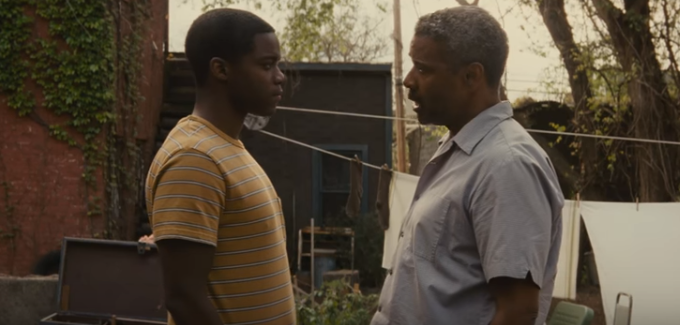By Zoë Smith
Denzel Washington, a two-time Academy Award-winning actor, has never failed to impress through his work and contributions to the film industry. Even though he has made a name for himself as an actor, having starred in films such as “Malcom X” and “Glory”, he has continued to explore other aspects of his trade, making him even more well-respected in the film community. Washington has directed films in the past, but none have come close to his newest film, “Fences”. His ability to create a film that emotionally invests its audience speaks volumes to not only his acting ability, but also to his aptitude for directing.
“Fences”, starring Washington and Viola Davis, focuses on the African-American lifestyle during the 1950s. The plot follows the life of Troy Maxson (Washington), a character that encompasses many identities. He is a father, husband, and working African-American amid the changing racial climate of the United States. His relationships with others in the film, such as his wife Rose (Davis), sons Cory (Jovan Adepo) and Lyons (Russell Hornsby), brother Gabriel (Mykelti Williamson), and friend Bono (Stephen McKinley Henderson) give the story its depth and relatability.
Washington deftly produces a dynamic atmosphere through Troy’s relationships. Since “Fences” focuses on the conflicts between the characters, it provides the audience an avenue for validation of their own interpersonal conflicts. Such a connection between fiction and the audience’s real-life struggles makes “Fences” highly relatable. Consequently, Washington created a piece that allows audiences outside of Troy’s demographics to relate. Troy is a flawed man. He has an affair resulting in a child from his mistress. He is a father who, like many parents, struggles to find the balance between preventing his children from making mistakes and pushing them to succeed. His brother is a disabled veteran. He has known failure. He feels pain. He, like many other individuals, feels the toll such hardships can take on a person.

The film continually reminds the audience of small, everyday sacrifices people make for others and how such compromises can build up over time. On the surface, Rose is a devoted, hard-working wife and mother. As the plot progresses, Davis’s performance becomes more and more impressive. She taps into the audience’s empathy, taking them on the same emotional journey that her character embarks on. Viewers feel pain and suffering when Rose does. She makes the audience curse at how unfair and complicated life is. She makes viewers ask themselves difficult questions. Have I made the wrong decision in life? Through the pain, Davis creates a sense of trust between Rose and her audience. Viewers look to Rose for emotional resolution. As she turns her losses into determination and resilience, the audience is able to experience the same empowerment as she does. Just as a mother sends her child into the real world, Rose leaves her audience with enough knowledge to develop their own resolves.
“Fences” was thoughtfully cast, bringing in a group of actors who were able to execute Washington’s vision in a seemingly effortless manner. The film encompasses common struggles all individuals are faced with. Such relatability, coupled with the actors’ breathtaking performances, left viewers addressing such conflicts in their own lives. The impact the film leaves on its audience is what makes “Fences” such a success. Washington’s film adaptation of the play did playwright August Wilson justice. It should come as no surprise that “Fences” is a 2017 Oscar nominee for Best Picture.
